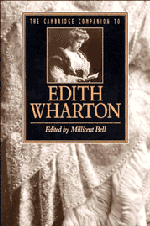Book contents
- Frontmatter
- Introduction
- 1 The Social Subject in The Age of Innocence
- 2 Edith Wharton and the Science of Manners
- 3 Edith Wharton and Race
- 4 The Custom of the Country
- 5 The Female Conscience in Wharton's Shorter Fiction
- 6 Law, Language, and Ritual in Summer
- 7 The House of Mirth
- 8 The Fruit of the Tree
- 9 The Valley of Decision
- 10 Edith Wharton's Valley of Decision
- Bibliography
- Index
- Series List
10 - Edith Wharton's Valley of Decision
A Rediscovered Contemporary Critique
Published online by Cambridge University Press: 28 May 2006
- Frontmatter
- Introduction
- 1 The Social Subject in The Age of Innocence
- 2 Edith Wharton and the Science of Manners
- 3 Edith Wharton and Race
- 4 The Custom of the Country
- 5 The Female Conscience in Wharton's Shorter Fiction
- 6 Law, Language, and Ritual in Summer
- 7 The House of Mirth
- 8 The Fruit of the Tree
- 9 The Valley of Decision
- 10 Edith Wharton's Valley of Decision
- Bibliography
- Index
- Series List
Summary
I do not know whether Mrs. Wharton's novel will be appreciated in Italy. The feelings a country can arouse in the imagination of foreigners is one of the greatest gifts that country can give to the world (and every country, like every epoch, climate, or personality can lend to the great symphony of the universe, one note, one timbre, sometimes a wondrous stretch of melody, completely individual). Yet mostly this gift exists only in the perception of whoever receives it and cannot be conveyed to the inhabitants of the country that has bestowed it. Later, when cosmopolitan scholarship has explained foreign literature and created a taste for it, that country's readers may learn to enjoy those same impressions that their landscapes, their cities, their very physical and spiritual attributes had produced in the minds of others. Thus Taine succeeded in conveying to Italian readers the full impact of the terrible or exquisite images that Italy had induced in the bizarre minds of Elizabethan dramatists. Thus my treasured and greatly esteemed friend Enrico Nencioni superbly managed to extract from Shelley's poetry (and, above all, from Browning's) that marvelous essence which those two supreme poets had distilled from Italy.
- Type
- Chapter
- Information
- The Cambridge Companion to Edith Wharton , pp. 199 - 202Publisher: Cambridge University PressPrint publication year: 1995

